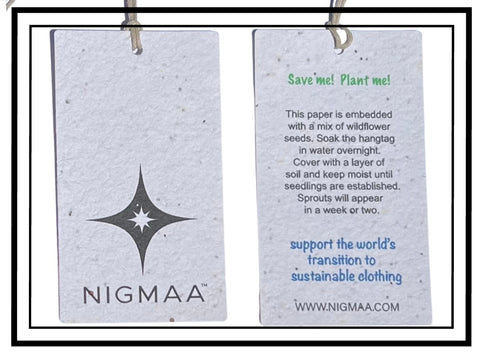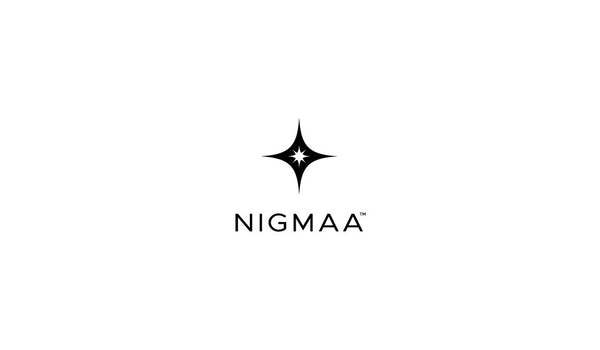Sustainability
Sustainability Is A Practice
At Nigmaa, sustainability is the touchstone of our identity. We’ve carefully considered all aspects of our production process, from the crops growing in the field to the package that arrives on your doorstep.
Our goal is not simply to incorporate sustainability into our brand, but to design beautiful, timeless items that minimize waste every step of the way.
Sustainability is a lifestyle- a series of small actions which together create a big impact. Change does not happen overnight- it’s more about the journey of working towards making things better- progress over perfection. The health of the environment is more vital than ever, and we believe we all have a responsibility to make ethical choices. We hope our clothing makes a few of these choices easy.
What is Sustainability?
How do our clothes impact climate change? The answer depends on the garment. There are many factors to consider when thinking about clothing sustainability: fibers and materials, factory partnerships, packaging and shipping. Many clothing companies are beginning to incorporate sustainability initiatives- which we are thrilled to see. Utilizing deadstock fabric ( leftover or canceled fabric) although not always traceable, is definitely a step in the right direction towards reducing textile waste.
Fibers and Materials
The fibers and materials that Nigmaa chooses reduce harm to the environment:
- Organic Cotton: Organic cotton is grown without hazardous chemical pesticides or fertilizers, avoiding a great deal of toxic runoff. These crops typically incorporate crop rotation to maintain the natural health of the soil. Nigmaa uses organic cotton that is certified by The Global Organic Textile Standard ( GOTS ) To obtain this certification, every element of production is inspected, including energy and water use, wastewater treatment, dye processing, and the social standards of the factories. All stages of the process are then certified by a third party.
- Hemp: When it comes to clothing, there are many benefits of hemp. Hemp crops require less water, promote soil health by requiring little to no fertilizers or pesticides, and naturally reduce greenhouse gases. Hemp is also a strong fabric that holds up well over time, extending the lifetime of the garment. This is a fundamental goal of our company- to create quality products that last- and hopefully is a goal of yours as a conscious consumer.
-
Recycled Polyester: Traditional polyester is typically made from petroleum in a process that is very taxing on the environment. Recycled polyester takes plastics that would otherwise end up in a landfill and repurposes them into a soft yet durable fabric. Choosing recycled polyester significantly reduces environmental impact and can also be recycled again when a garment needs to be replaced.
Factory Partnership
We believe knowing the origin of all fibers and materials is essential to making sustainable clothing. To that end, we’ve partnered with long-trusted factories. We know the people. We’ve been there. We’ve seen them in action. By partnering with factories we categorically trust, we hope to earn your trust as well.
Packaging and Shipping
We know shipping takes a toll on the environment, and we’ve taken some imaginative measures to minimize that toll. First off, our small batch production runs are packed in one master poly bag- yes, plastic, but unavoidable to protect the garments- NOT individual poly bags. Our products are then shipped to our customers in biodegradable and compostable mailers. We use hemp twine instead of plastic swift- tacks for attaching our hangtags. Our hangtags and bracelet cards are made from wildflower seed embedded recycled paper so that you “ plant” them in soil to grow wildflowers instead of throwing them away.

What Role Does Minimalism Play in Sustainability?
Nigmaa embraces minimalism as both an aesthetic and a responsibility. While the link between link between minimalism and sustainability might not be immediately obvious, when we reduce our overall consumption and buy mindfully, we greatly reduce our overall waste. Beautiful, versatile clothing that can be dressed up or down means more outfits, more space in your closet or suitcase, and more time to do what you love. Rather than chasing the latest disposable trend, we design clothing essentials that are simple, elegant, and timeless. Our clothing is designed to leave a lasting impression on the room, not the planet.
What is Upcycling?
Upcycling is the practice of taking a used or unwanted garments or fabric scraps and making creative alterations to give it new life. Due to the handmade nature of the process, every upcycled garment is unique. In the case of our upcycled accessories, depending on how much fabric we start with, we are sometimes able to make small batches of similar items. Upcycling can transform a garment from nothing special to noteworthy, minimizing waste and adding value, for truly zero waste fashion. You can browse through our current inventory of upcycled pieces and also see past garments in our gallery.
